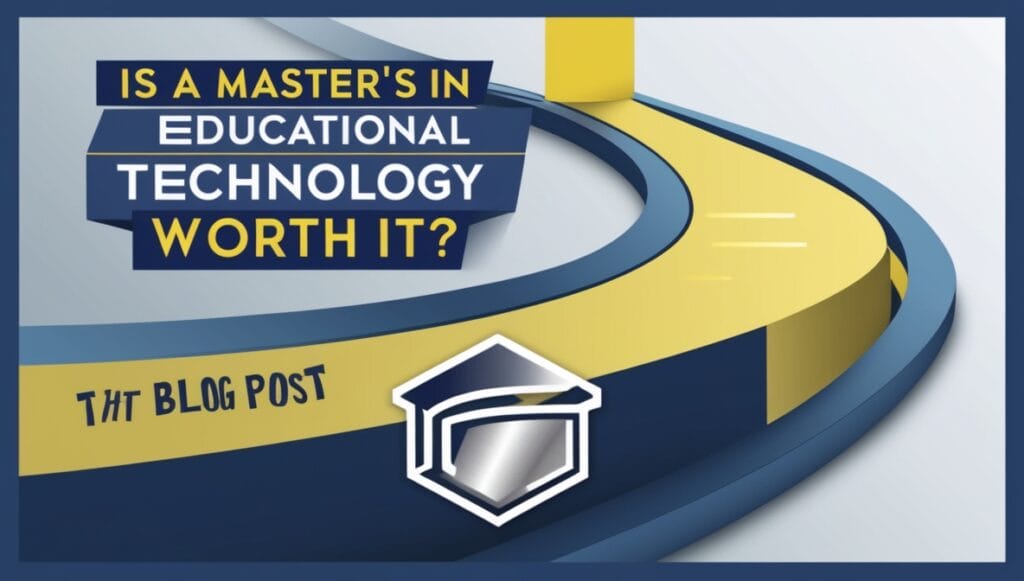Is a masters in educational technology worth it
Description

A Master’s in Educational Technology (EdTech) is increasingly gaining attention as the education sector embraces technological advancements. This graduate degree focuses on integrating technology into teaching and learning environments, preparing professionals to design, implement, and manage innovative educational tools and systems. It equips educators, instructional designers, and technology specialists with the skills to enhance learning experiences and improve educational outcomes in diverse settings, including schools, colleges, corporate training programs, and non-profit organizations.
The degree offers a comprehensive curriculum that typically covers topics such as instructional design, e-learning development, educational software evaluation, and the application of emerging technologies like AI and VR in education. These skills address the growing demand for tech-savvy professionals capable of transforming traditional learning environments into interactive and engaging platforms.
From a career perspective, a Master’s in EdTech opens doors to roles like instructional designer, educational technologist, curriculum developer, and e-learning consultant. Additionally, with the rapid digitization of education, professionals in this field often experience strong job stability and opportunities for growth. However, potential candidates should consider financial aspects, such as tuition costs and expected salary increases, when evaluating the return on investment for this degree.
Ultimately, a Master’s in Educational Technology can be a valuable credential for those passionate about revolutionizing education through technology, offering the potential for rewarding careers and impactful contributions to the field.
Key Benefits of a Master’s in Educational Technology
Career Advancement
A Master’s in Educational Technology significantly enhances career prospects by qualifying graduates for advanced roles that demand specialized expertise in integrating technology into educational practices. Positions such as instructional coordinators, school administrators, and corporate trainers are attainable with this degree. Many leadership roles within education require a master’s degree for certification, ensuring that candidates meet the standards necessary for overseeing instructional programs, managing educational technology implementations, or leading staff development initiatives. Moreover, the degree provides a competitive edge in securing positions that shape educational policies and drive innovation in learning environments.
Increased Earning Potential
One of the most appealing benefits of earning a Master’s in Educational Technology is the potential for higher salaries. The specialized knowledge and skills acquired in this program make graduates valuable assets in the workforce. For instance:
- Instructional Technologist roles offer annual salaries ranging between $43,000 and $76,000, reflecting the demand for professionals adept at improving teaching methods through technology.
- Training and Development Managers, who often work in corporate settings to enhance employee education programs, can earn an impressive average salary of $125,040.
- Postsecondary Education Administrators, responsible for managing educational programs and services in colleges or universities, have a median salary of $102,610.
These figures underscore the financial advantages of pursuing this advanced degree, especially for individuals aiming for leadership or specialized roles.
Skill Development
A Master’s program in Educational Technology is meticulously designed to provide students with cutting-edge skills that align with the evolving demands of education and training environments. Key areas of focus include:
- Integrating Technology in Education: Students learn how to effectively incorporate tools such as learning management systems, virtual reality, and AI to enhance teaching and engagement.
- Instructional Design and Analysis: Graduates are trained to analyze educational needs, design technology-driven learning experiences, and assess their effectiveness.
- Improving Learning Outcomes: Programs emphasize strategies for using technology to address diverse learning styles and optimize outcomes for all learners.
These competencies prepare graduates to lead the charge in transforming traditional educational practices, fostering innovation, and improving both teaching methodologies and student performance.
In summary, pursuing a Master’s in Educational Technology provides a pathway to rewarding careers, substantial financial benefits, and the opportunity to make a significant impact in modernizing education through technology.
Career Opportunities with a Master’s in Educational Technology
In Education
- Classroom Teacher
Educators with a Master’s in Educational Technology bring advanced skills to their classrooms, making lessons more engaging and effective. They integrate tools such as smart boards, educational software, and online resources to enhance student learning experiences. These teachers often take leadership roles in schools, guiding peers in adopting new technologies and methodologies to improve instructional practices. Their expertise helps bridge the gap between traditional teaching approaches and modern, tech-driven education. - Instructional Designer
Instructional designers play a pivotal role in creating and optimizing educational content. Leveraging their understanding of pedagogy and technology, they design curricula, online courses, and e-learning materials tailored to diverse learning needs. They work in schools, universities, or private organizations, ensuring that instructional materials align with learning objectives and technological trends. Their work often involves using tools like Articulate Storyline or Adobe Captivate to develop interactive learning modules. - Curriculum Developer
Curriculum developers focus on structuring educational programs that incorporate technology to improve teaching effectiveness and student engagement. They research emerging trends, evaluate existing materials, and design new curricula that integrate tools such as gamification, virtual labs, and AI-driven assessments. Often collaborating with educators and administrators, these professionals ensure that instructional content meets academic standards and enhances learning outcomes. - Media Specialist
Media specialists are responsible for managing and curating educational resources in libraries, schools, or other institutions. They help educators and students access digital tools, e-books, multimedia materials, and learning platforms. By staying updated on the latest educational technologies, they ensure that institutions provide cutting-edge resources for teaching and learning. Their role often includes training staff and students on using these tools effectively.
Outside Education
- Corporate Trainer
Corporate trainers design and deliver technology-focused training programs to improve employee skills and productivity. They create workshops, webinars, and digital courses tailored to organizational goals, often utilizing e-learning platforms and multimedia tools. Their ability to convey complex technical concepts in a clear and engaging manner is essential for companies looking to upskill their workforce in a competitive marketplace. - Technology Consultant
Technology consultants advise educational institutions, businesses, or non-profits on integrating technology into their operations. They assess organizational needs, recommend tools and systems, and oversee implementation processes. Their expertise in educational technologies and platforms positions them as key contributors to modernizing workflows and enhancing efficiency across sectors. - Project Manager
Project managers with an EdTech background oversee the development and implementation of educational technology projects. From managing timelines and budgets to coordinating cross-functional teams, they ensure that initiatives like learning management systems or training programs are delivered successfully. Their technical expertise and leadership skills enable them to balance innovation with practicality, meeting organizational objectives effectively. - Technical Writer
Technical writers create clear, user-friendly documentation for educational technologies, such as user guides, manuals, and online help systems. Their role involves translating complex technical information into accessible content for educators, students, or corporate clients. With a deep understanding of both technology and education, these writers help users maximize the potential of EdTech tools.
Graduates of a Master’s in Educational Technology can choose from a variety of fulfilling career paths, whether within traditional educational settings or in broader industries. Their specialized knowledge positions them to lead in the integration of technology and innovation, shaping the future of education and training.
Program Structure and Duration for a Master’s in Educational Technology
Program Length
Most Master’s in Educational Technology programs are designed to be completed within two years of full-time study, providing a balance of theoretical knowledge and practical application. However, for individuals seeking faster completion, many institutions offer accelerated options, allowing students to graduate in as little as 12 months. These accelerated programs are intensive, requiring a higher workload but are ideal for professionals aiming to advance their careers quickly. Part-time options are also available, catering to working professionals who prefer a more flexible pace, which typically extends the program length to three to four years.
The duration may vary depending on the mode of study (online or on-campus), prior qualifications, and whether the student chooses to complete additional research projects or certifications alongside the core curriculum. This flexibility ensures that the program can accommodate diverse schedules and career goals.
Curriculum Focus
The curriculum of a Master’s in Educational Technology is structured to provide both foundational knowledge and specialized skills required to excel in technology-enhanced educational environments. Key areas of focus include:
- Educational Research: Students explore methodologies for conducting research in educational settings, enabling them to analyze and evaluate the effectiveness of various technologies and teaching strategies.
- Digital Learning Tools: Courses delve into the practical use of e-learning platforms, educational software, and emerging technologies such as virtual reality (VR) and artificial intelligence (AI). Students gain hands-on experience in selecting and implementing tools that enhance learning outcomes.
- Instructional Methods: Programs emphasize the design and delivery of effective instructional content tailored to diverse learner needs. This includes training in instructional design models, multimedia integration, and methods for engaging online and in-person audiences.
Many programs also feature capstone projects or practical internships. These provide students with real-world experience by applying theoretical concepts to solve challenges in educational technology settings. For example, a student may design an e-learning module for a school or develop a technology integration plan for a corporate training program.By offering a well-rounded structure and a mix of theoretical and applied learning, these programs equip graduates with the knowledge and skills necessary to drive innovation in educational technology across various professional environments.
Financial Considerations for a Master’s in Educational Technology
Tuition Costs
The cost of pursuing a Master’s in Educational Technology varies depending on factors such as the institution, program format (online or on-campus), and residency status. Tuition for an online program typically ranges between $15,000 and $26,000, making it a relatively affordable option for advanced education. On-campus programs may have similar or slightly higher costs due to additional fees associated with facilities and resources.
Accredited programs often offer financial aid options, including scholarships, grants, and loans, to help ease the financial burden for students. Some institutions also provide tuition reimbursement programs for working professionals whose employers support continuing education. Additionally, military veterans or active-duty service members may qualify for further financial assistance. It’s essential for prospective students to explore all available options, including work-study opportunities, to minimize out-of-pocket expenses.
Return on Investment
Investing in a Master’s in Educational Technology can yield substantial financial and professional rewards. For many educators, the salary increase associated with obtaining a master’s degree offsets the initial costs within a few years. For example:
- Teachers with advanced degrees often earn higher salaries than their peers without a master’s, with the potential to earn tens of thousands more over their careers.
- Professionals in roles such as instructional designers, corporate trainers, or education administrators can also see significant boosts in earning potential, with median salaries ranging from $76,000 to $125,000, depending on the position.
Beyond financial benefits, the degree provides long-term career stability and growth opportunities, which can further enhance the return on investment. By equipping graduates with in-demand skills and credentials, a Master’s in Educational Technology ensures they remain competitive in an evolving job market. While tuition costs may seem high initially, the combination of financial aid options and career advancement opportunities makes a Master’s in Educational Technology a worthwhile investment for those passionate about driving innovation in education.
Conclusion:
A Master’s in Educational Technology is an excellent choice for individuals passionate about enhancing education through innovative technology. This degree opens doors to diverse career opportunities in both educational institutions and corporate settings, offering roles such as instructional designers, curriculum developers, and corporate trainers. Additionally, it provides the potential for increased earnings, with many graduates seeing significant salary boosts in leadership and specialized positions.
The program equips students with valuable skills, such as integrating digital tools into learning environments, designing effective instructional methods, and utilizing advanced technologies like virtual reality and AI. These skills are highly relevant in today’s digital era, where technology-driven education is becoming the norm.
When considering this degree, prospective students should carefully evaluate their career aspirations, ensure the program is accredited, and assess the financial aspects, including tuition costs and available financial aid. For those dedicated to driving educational innovation, a Master’s in Educational Technology is a rewarding and forward-thinking investment.
FAQS:
- What are the key benefits of a master’s in educational technology?
It enhances career prospects, increases earning potential, and equips you with skills to integrate technology into learning. - How does the cost of a master’s in educational technology compare across different universities?
Costs range from $15,000 to $26,000 for online programs, varying by institution and format. - What career opportunities are available with a master’s in educational technology?
Graduates can pursue roles such as instructional designer, corporate trainer, curriculum developer, or media specialist. - How long does it typically take to complete a master’s in educational technology?
Most programs take two years, with accelerated options available in as little as 12 months. - What are the main skills you’ll learn in an educational technology program?
You’ll learn to integrate digital tools, design instructional materials, and implement effective learning strategies.




